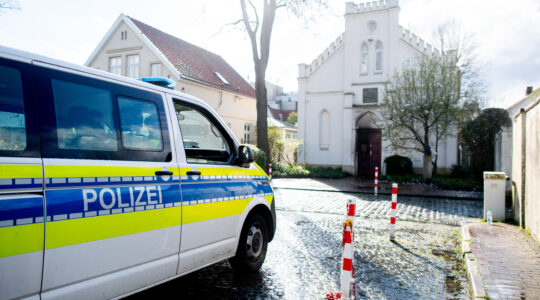PRAGUE (JTA) — Seth Fiegerman ambles through one of Europe’s most alluring Jewish quarters each day on his way to school.The tilting headstones of Prague’s Jewish cemetery and the sawtooth gables of the medieval Old New Synagogue have awakened his Jewish identity during his college semester abroad at a New York University campus in the Czech capital.Still, Fiegerman, 20, of Roslyn Heights, N.Y., hasn’t made any plans to attend a seder, even though it’s only three weeks until Passover.He also has made no contact with local or expatriate Jews since coming here in mid-January, despite his daily sojourns past the Prague Jewish community headquarters on Maiselova Street in the Old Town. “I am a foreigner here and I don’t feel comfortable walking into a room of strangers,” Fiegerman said. “I view Judaism more as a family tradition than religion.” Since his family is far away, so is the promise of gefilte fish and the Four Questions.The same may be true for many young Jews studying abroad who aren’t especially observant, but do celebrate major Jewish holidays when they’re home. Fiegerman is among an increasing number of students opting to spend a semester of their college studies outside the United States. More than 200,000 American college students studied abroad last year, an increase of 8 percent over the previous year, according to a report published by the International Institute of Education.There are no estimates of the number of Jewish students, but Aaron Goldberg, director of the international division of Hillel: The Foundation for Campus Jewish Life, said large numbers of Jews are choosing international study, and that Figerman’s experience is not atypical.”American students often lack an understanding of Jewish life abroad,” Goldberg said.Hillel is embarking on several initiatives to improve the situation. The organization helped re-establish the long-defunct American Union of Jewish Students in December 2006 to foster interaction with the World Union of Jewish Students. Avi Richman, recently appointed a Bronfman fellow at Hillel, is spearheading an effort to help American Jews studying abroad cultivate relationships with local Jews.”When nobody is inviting the students anywhere, it’s really sad,” Richman said, recalling his time in Florence two years ago on a study-abroad program. Richman’s first attendance at a World Union meeting already is paying off: Several European Jewish student leaders he met are now inviting American Jewish university students to their events. With the exception of observant students, who usually have a plan to maintain that observance before they leave home, many Jewish American students studying abroad are too intimidated by cultural differences, linguistic obstacles and new environments to actively seek out Jewish life.In addition, the local Jewish communities often are not aware of the students’ existence. “I didn’t know there were so many there, or any at all,” said Jakub Roth, vice president of the Prague Jewish Community, when told that a significant proportion of the NYU students in Prague were Jewish. “Now that you tell me, we will try to reach out to them.” Fiegerman and other students provide plenty of examples about how easy it is get lost in the Passover shuffle.Michael Cavayero, a sophomore from Woodbury, N.Y., also has no plans yet for Passover, but said he would be interested to see how Czechs mark the event. Still, he said that without an invitation, most students are unlikely to show up alone at a Passover meal with people they don’t know.In New York, “people from the Bronfman Center are on the streets giving you candy and fliers. They grab you psychologically and literally,” Cavayero said, referring to The Bronfman Center for Jewish Student Life at NYU.Such a proactive approach is unlikely to happen in any European capital. Whitney Portnoy, an NYU in Prague student from Melville, N.Y., jokes that back home she”kind of lives at the Bronfman Center.” She also is a board member of Kesher, the national student movement of Reform Judaism.Portnoy said she has done nothing Jewish-related in Prague, where there are about 1,500 members of the Jewish community, in contrast to 1.7 million in New York.She has a friend at NYU in Prague who is Orthodox and attends Chabad-run services, but Portnoy said she doesn’t feel comfortable sitting behind a mechitza. Most European services are Orthodox, even when the congregations are not, and that often surprises some American expatriates and students. If Portnoy does anything for Passover this year, it likely will involve creating a paper seder plate with friends and downloading a Haggadah from Google.Asked about the prospect of getting to know Czech Jews by attending a seder, she said it hadn’t crossed her mind.Roth said that if American Jews do join a Czech event, they should be prepared for a different culture, meaning people who are more reserved than what they’re used to. “When you come the first time, people are not going to be running up to you and telling you how glad they are that you showed up,” he said. “Czechs are a bit different than Americans.” Certainly there are many cities in Europe and around the world where Jews welcome other Jews, young and old, into their homes after meeting in the synagogue or on the street.Max Orenstein, an NYU student in Madrid for a semester, said he had been invited home for Shabbat by a family he met at the Orthodox synagogue he attended for services. Orenstein speaks some Spanish, which made the home visit much easier. Even in an era of Voice over Internet Protocol, YouTube and Web cams, person-to-person contact remains the essential element behind ensuring that young people celebrate the Jewish holidays.”If somebody here invited me, I would go to a seder,” Fiegerman said.That response was echoed by all students interviewed on the topic: They may not seek out Jewish life abroad, but they easily could be coaxed to experience it with even a modicum of outreach.”I want to see the shank bone shining in the window and wander into the room where I am welcomed,” Fiegerman said, “but I am not going to look for it myself.”(Dinah Spritzer teaches international reporting at NYU in Prague.)





